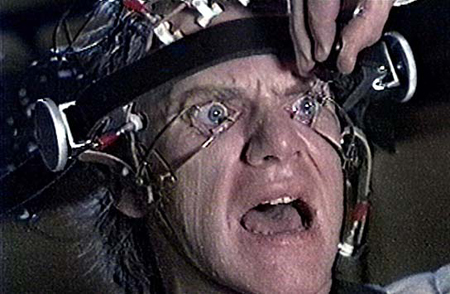After last night’s Super Bowl I watched “The Social Network” again, this time with screenwriter Aaron Sorkin’s obsessively dark rage towards Governor Sarah Palin in mind. The first time I saw director David Fincher’s cold but compelling story involving all the emotional and legal entanglements behind the founding of Facebook, I wasn’t aware of Sorkin’s platinum membership in the HeManConservativeWomanRager’s Club. I knew he was a jerk, everyone knows that, but this strange, twisted need of his to publicly demean and humiliate Governor Palin hadn’t yet revealed itself and with that in mind, it added a whole new subtext to a story that even some liberal critics found unsettling for its almost universally degrading portrayal of women.
The furor has has since died down, but immediately after the Oscar-nominated film was released more than one critic pointed out that the female characters in “The Social Network” are mostly beautiful sluts, beautiful crazies or barely-clothed set dressing always getting high or drunk and more than willing to give it up on their knees in a men’s bathroom. There’s also the main character, Facebook Co-counder Mark Zuckerberg, who’s portrayed as a insecure man seething with hostility towards women, especially after he’s dumped by his girlfriend in the opening scene. Sorkin would have us believe that what drove Zuckerberg to create Facebook was a desire to prove himself to that very same girl, while in reality Zuckerberg claims he was with the same girlfriend he has now during that time — an Asian girl named Priscilla Chan (and it’s a couple of Asian girls who take the worst beatings in Sorkin’s film).
Defending his work, Sorkin wrote the following:
I was writing about a very angry and deeply misogynistic group of people. These aren’t the cuddly nerds we made movies about in the 80’s. They’re very angry that the cheerleader still wants to go out with the quarterback instead of the men (boys) who are running the universe right now. The women they surround themselves with aren’t women who challenge them (and frankly, no woman who could challenge them would be interested in being anywhere near them.)
You can read a devastating response to that here.
But in other words, Sorkin punts and blames all of Harvard for what many perceived as the film’s disturbing misogyny (but I thought Harvard was a progressive school?). You see, it’s not Sorkin who has hostility issues towards women, he was simply portraying reality, portraying how intellectuals are bitterly angry that all the pretty girls still want nothing to do with them even though they perceive themselves as Masters of the Universe. Insert: record scratch.
In light of Sorkin’s seethingly vitriolic personal attacks on Governor Palin, does that sound a little close to home?
Since October Sorkin has launched three (that we know of) rages against Palin, none of them based on substance, all of them deeply personal. In the flurry of Sorkin’s anger, ad hominem, and frustration, it’s not hard to conclude that this goes well beyond partisanship. For whatever reason, Sorkin has some psychological need to hurt and demean the former Governor, to get to her, to have her pay attention to him:
Oct 4th: “Sarah Palin’s an idiot. This is a remarkably, stunningly, jawdroppingly incompetent and mean woman.”
Dec. 8th: “I get happy every time one of you faux-macho shitheads accidentally shoots another one of you in the face.”
And just this past weekend: “I think that we have big problems right now,” Sorkin said. “And Sarah Palin? She needs a therapist, okay? We need the smartest guys, the best Ph.D.s around to be solving these problems. I don’t have any patience for the glamorization of dumbness.”
Sorkin is likely to win an Oscar for his screenplay, but in light of all that we’ve learned since about the mangling of the facts creative license involved in portraying both Harvard and Zuckerberg, it’s probably safe to say that “The Social Network” is less about the creation of a social phenomenon and more about the tour of a troubled man’s decaying soul.

COMMENTS
Please let us know if you're having issues with commenting.